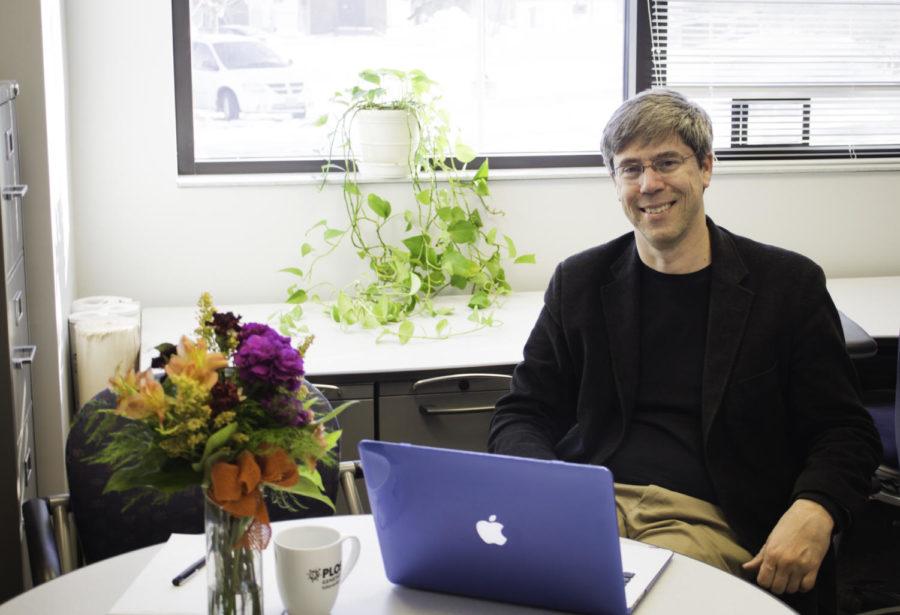Patrick Schnable named director of Plant Sciences Institute
Tomhas Huhnke/Iowa State Daily
Patrick Schnable, a Charles F. Curtiss Distinguished Professor in the College of Agriculture and Life Sciences, in his Roy J. Carver Co-Labratory office, Feb. 17, 2014. Professor Schnable has been named director of the Plant Sciences Institute at ISU, and is thoroughly excited about the work that will involve a multitude of engineering students working with agriculture and life sciences students as part of a mutual learning experience in research.
February 18, 2014
Patrick Schnable, distinguished professor of agronomy, has been named the director of Plant Sciences Institute at Iowa State University.
Between 2005 and 2010, Schnable held the associate director’s position.
“This is an extension of the associate’s position,” Schnable said.
Schnable is the second permanent director of the Plant Sciences Institute.
Schnable earned his bachelor’s degree in agronomy from Cornell University, and he received his doctorate in plant breeding and cytogenetics from Iowa State in 1986. Schnable has been a professor at Iowa State since 1988.
Schnable did not grow up on a farm, but on the outskirts of New York.
“At the young age of 10, I decided I wanted to be a plant breeder,” Schnable said. “As a kid, I was inspired by a magazine called Highlights.”
Even though Schnable is not exactly a plant breeder, he does work with the genotypes and phenotypes of plants. Schnable was a part of the team that sequenced the corn genome and co-wrote a paper in the journal “Science.”
Schnable’s everyday routine will change with the new position.
His main goal is to foster research and international research, and to move the university’s reputation to the next level.
“The position is a more complicated routine, but I get to work with great faculty and reach other colleges,” Schnable said.
The research will include creating a model that will help predict phenotypes, which is the physical appearance of a plant species. Iowa State University is experienced in genotyping, and there is a lot of technology to help with genotyping.
“If we know how the DNA will act with the environment and are able to predict the phenotype, then we can share this with farmers and plant breeders,” Schnable said.
Knowing the phenotype will help deal with the rapid climate changes and help produce the most yield.
As director, Schnable wants to reach out to the engineering, math and computer colleges to help determine the predictions of measurements and to help read the “big data,” Schnable said.
Schnable is presenting at the end of this week and early next week to announce his new ideas and the workshop that will be held in April. The workshop will help foster the interactions between colleagues.
“I want to encourage more scientists to work with other scientists,” Schnable said.
The research also presents an opportunity for undergraduate and graduate students to get involved. The students receive training and experience that broadens their education.
“The students are on the frontier of knowledge and they seem to take with them an appreciation for research,” Schnable said. “There is a great deal of potential for Iowa State University in this area.”
Schnable’s own research team has worked with six to 24 students before. The amount of students changes every year depending on the research project.
“Schnable was chosen because of his vision for the future of the Plant Sciences Institute,” said Kendall Lamkey, professor and chairman in agronomy. “He is an outstanding scientist, but I think it was because of his vision for the future [that he was named to this position].”







